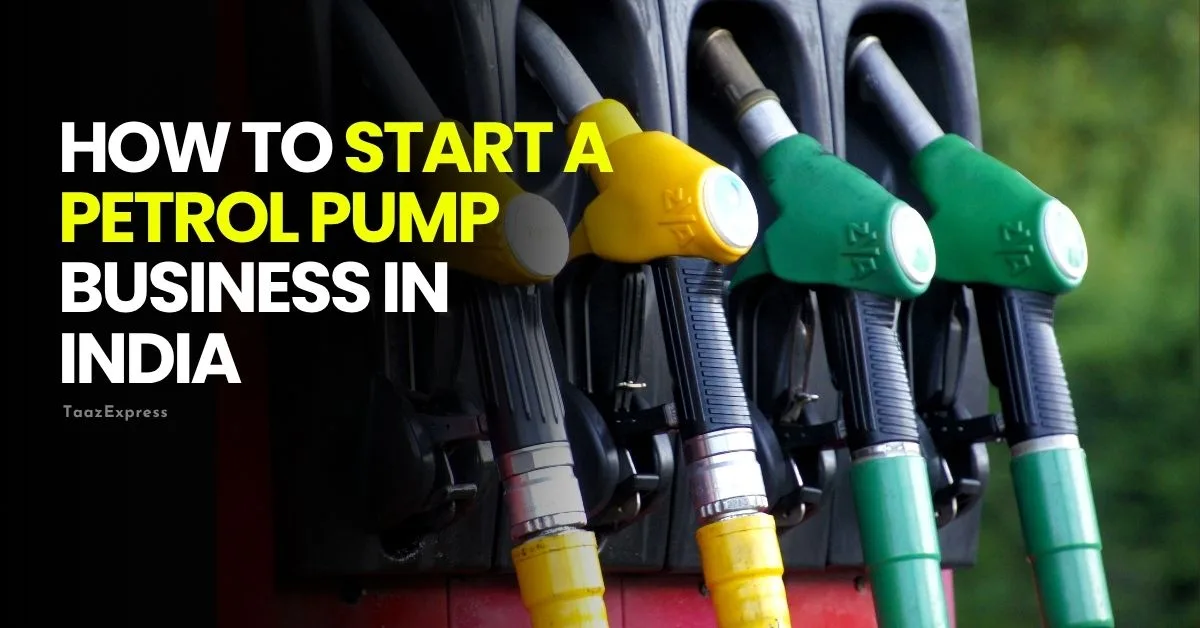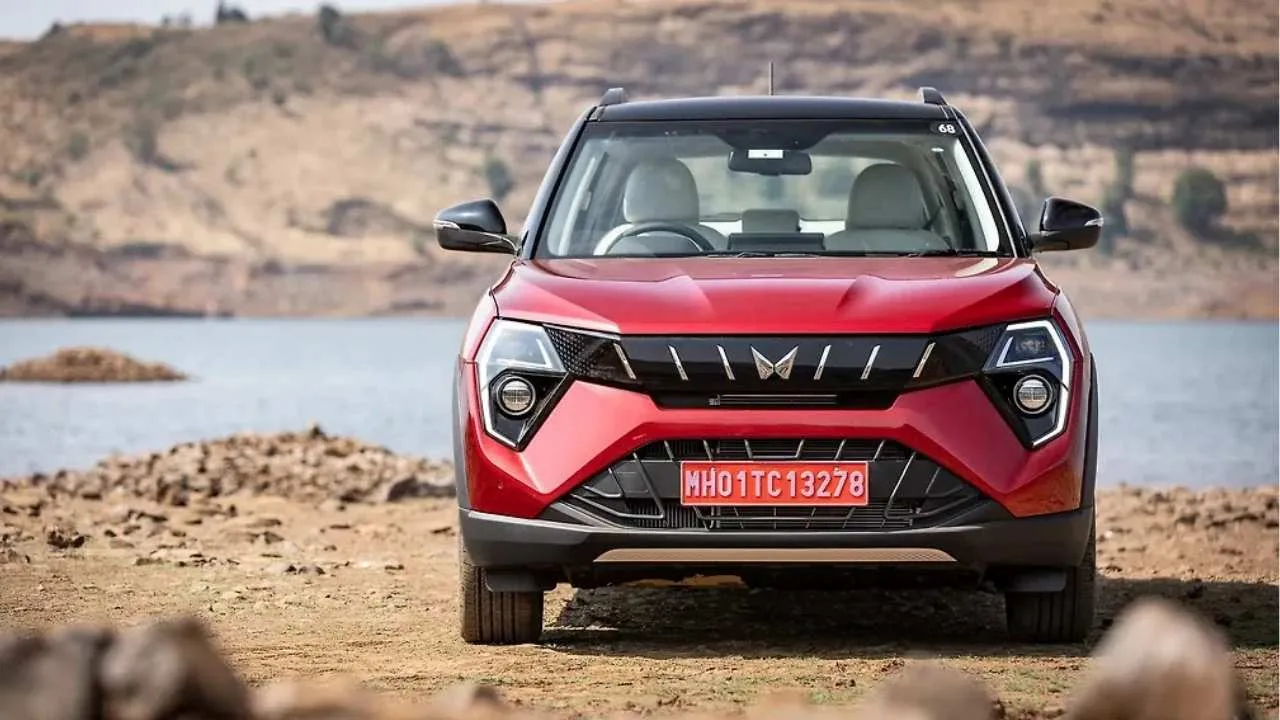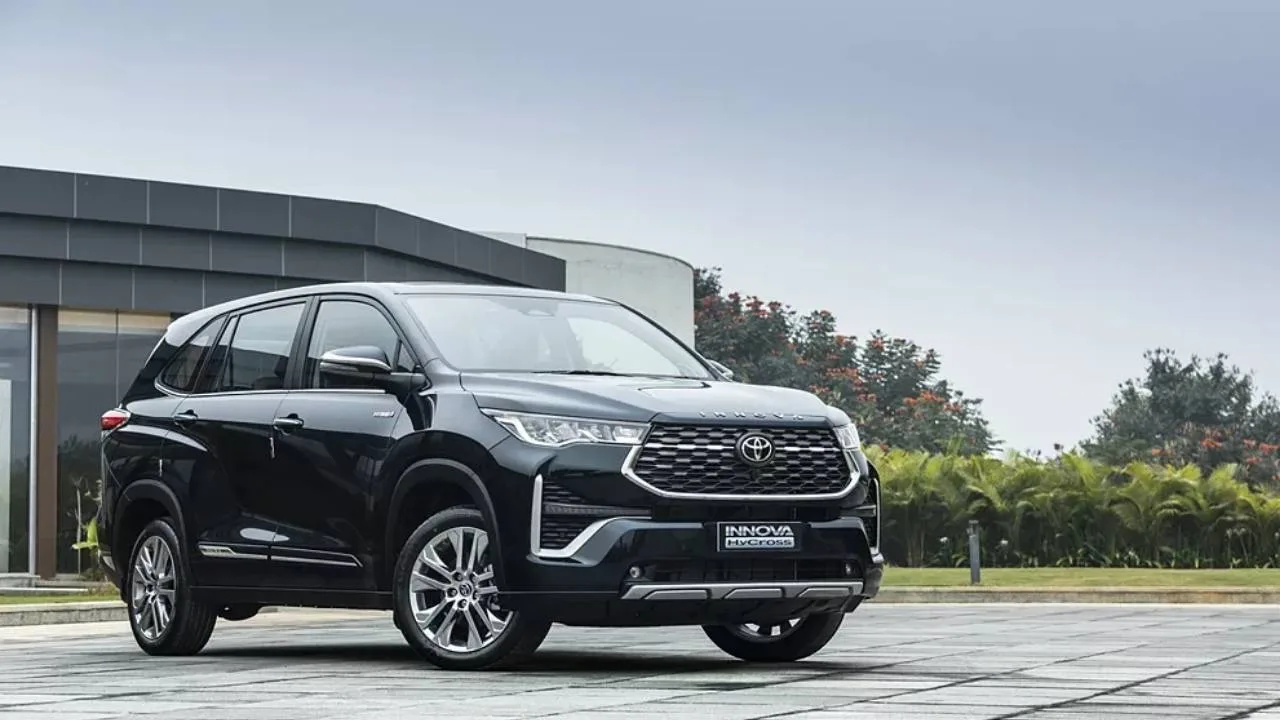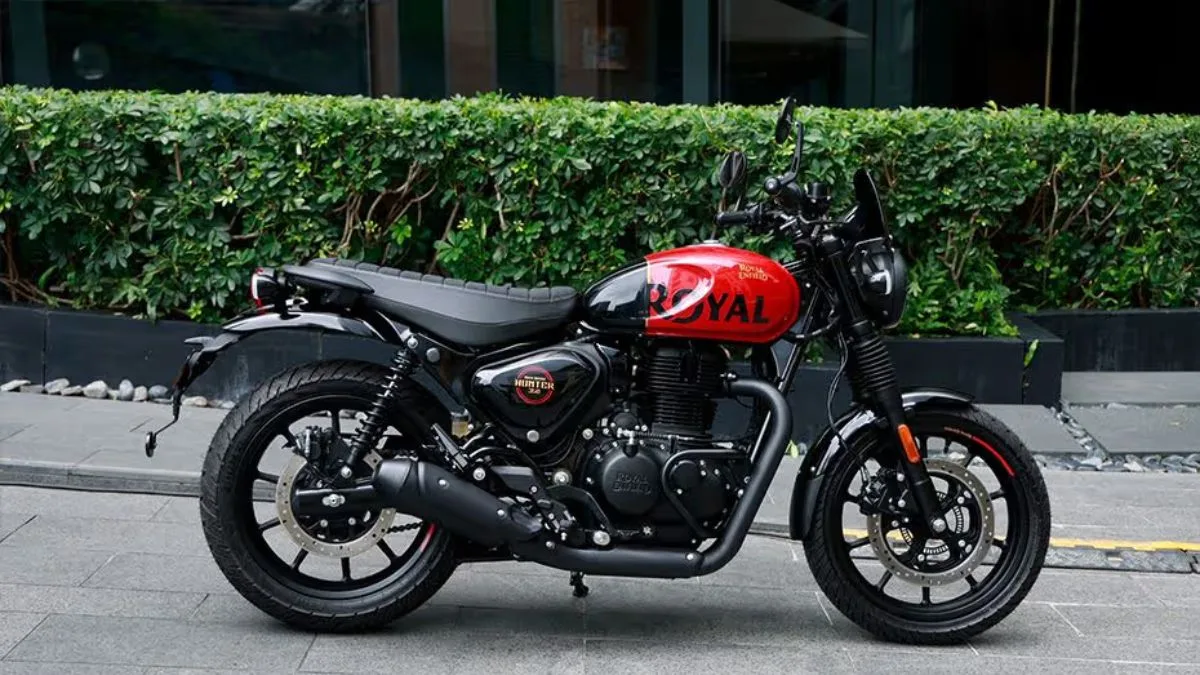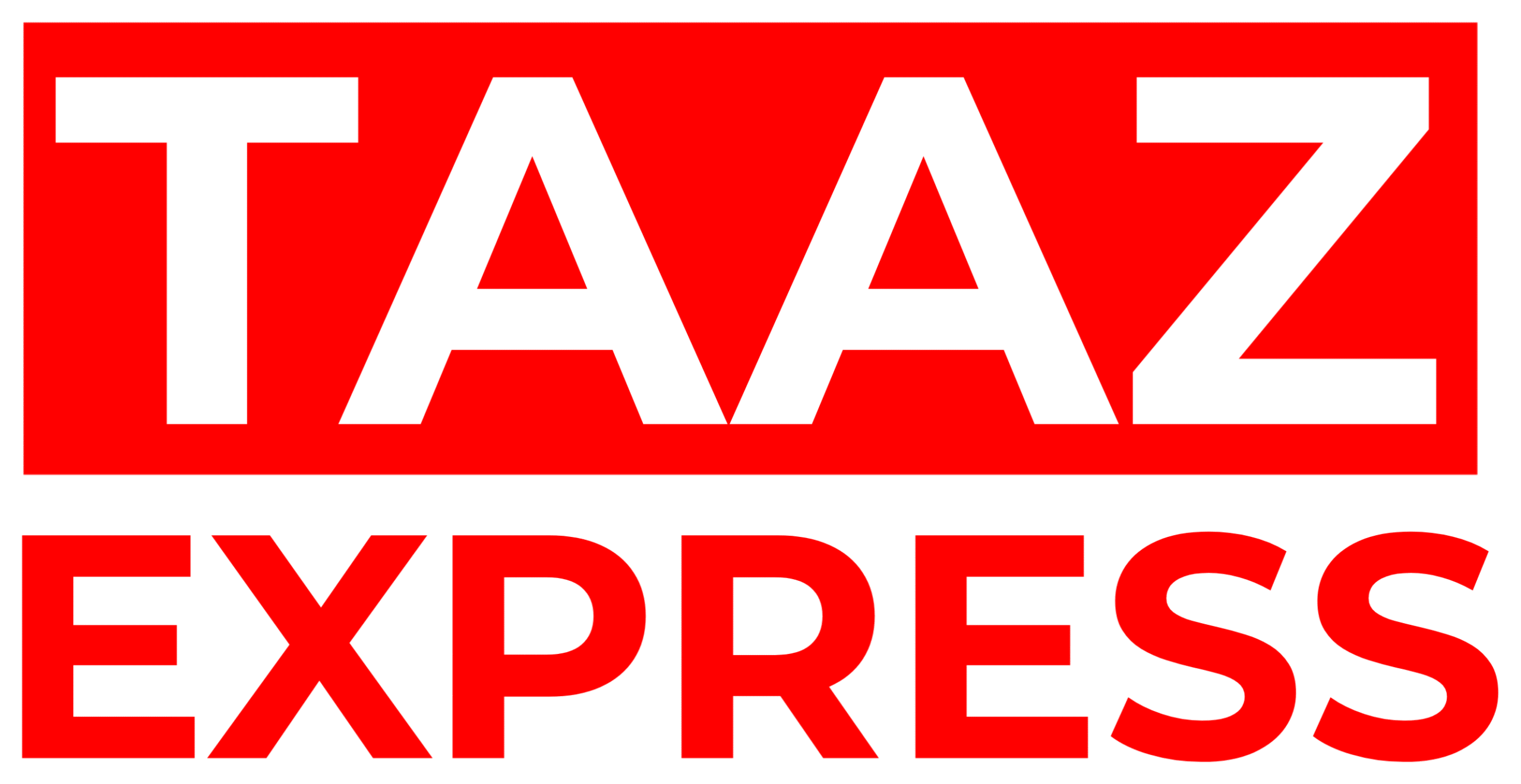In India, Fuel is an important part of transportation, and as the number of vehicles on the road increases, there is a corresponding rise in the demand for petrol and Diesel. Because of this, you should start a Petrol Pump Business in India for a profitable business.
This Article How to Start a Petrol Pump Business in India 2025 will explain all you need to know before starting a petrol pump in India, whether you’re an aspiring business owner or someone looking to invest in a stable business. We’ll keep everything simple, doable, and easy to follow, from eligibility and investment to legal permissions and setup.
Table of Contents
About The Petrol Pump Business
It’s important to know how the Indian Petrol pump business works before starting the process.
The growing number of vehicles, industrial requirements, and transportation services are all contributing to India’s growing fuel demand. Because of this, operating a petrol pump presents a steady, long-term business opportunity, particularly in areas with high vehicle traffic.
There are two main types of petrol pumps:
Company-Owned, Company-Operated (COCO): These are operated entirely by oil firms such as Hindustan Petroleum, Bharat Petroleum, or Indian Oil. While you can work for these stations, you won’t be their owner or manager.
The type you will apply for is Dealer-Owned, Company-Operated / Dealer-Owned, Dealer-Operated. You operate the business under the name of an oil company (like IOCL, BPCL, or HPCL) and either own or lease the land. You receive a commission on each litre of fuel sold, and the company provides the fuel.
There are several major oil companies in India:
- Indian Oil Corporation Ltd. (IOCL)
- Bharat Petroleum Corporation Ltd. (BPCL)
- Hindustan Petroleum Corporation Ltd. (HPCL)
- Reliance Petroleum
- Shell India
Each of them occasionally requests dealership applications, depending on their specific needs for locations and growth plans.
There is more to operating a petrol pump than just selling fuel. In addition to providing safety precautions, staff management, and stock tracking, it also offers extra services, such as engine oil sales, air filling, and, in certain locations, EV charging.
Eligibility Criteria on How to Start a Petrol Pump Business in India
In India, you have to fulfil a few requirements regarding age, education, financial stability, and experience to operate a Petrol pump. The oil companies have established these regulations to ensure that reliable and skilled individuals run dealerships.
| Criteria | Requirement |
|---|---|
| Age | Minimum 21 years, maximum 60 years |
| Citizenship | Must be an Indian citizen (PIOs/NRIs can apply under special conditions) |
| Educational Qualification | 10th pass (for rural outlets) or 12th pass (for regular outlets) |
| Financial Capability | Investment capacity of ₹75 lakh – ₹2 crore (via cash, FDs, shares, property) |
| Legal Background | Must have a clean record with no criminal history |
✅ Keep in mind that fulfilling all eligibility requirements is only the first step. Land suitability, document verification, and company evaluation all play a role in the final decision.
Petrol Pump Setup Cost
Starting a petrol pump business demands a large investment, however, the precise cost varies depending on several criteria such as location, kind of dealership, and land ownership. Your cost will be significantly reduced if you already own the land. To help you understand where the money goes, below is a breakdown.
💰 Estimated Investment Breakdown (2025)
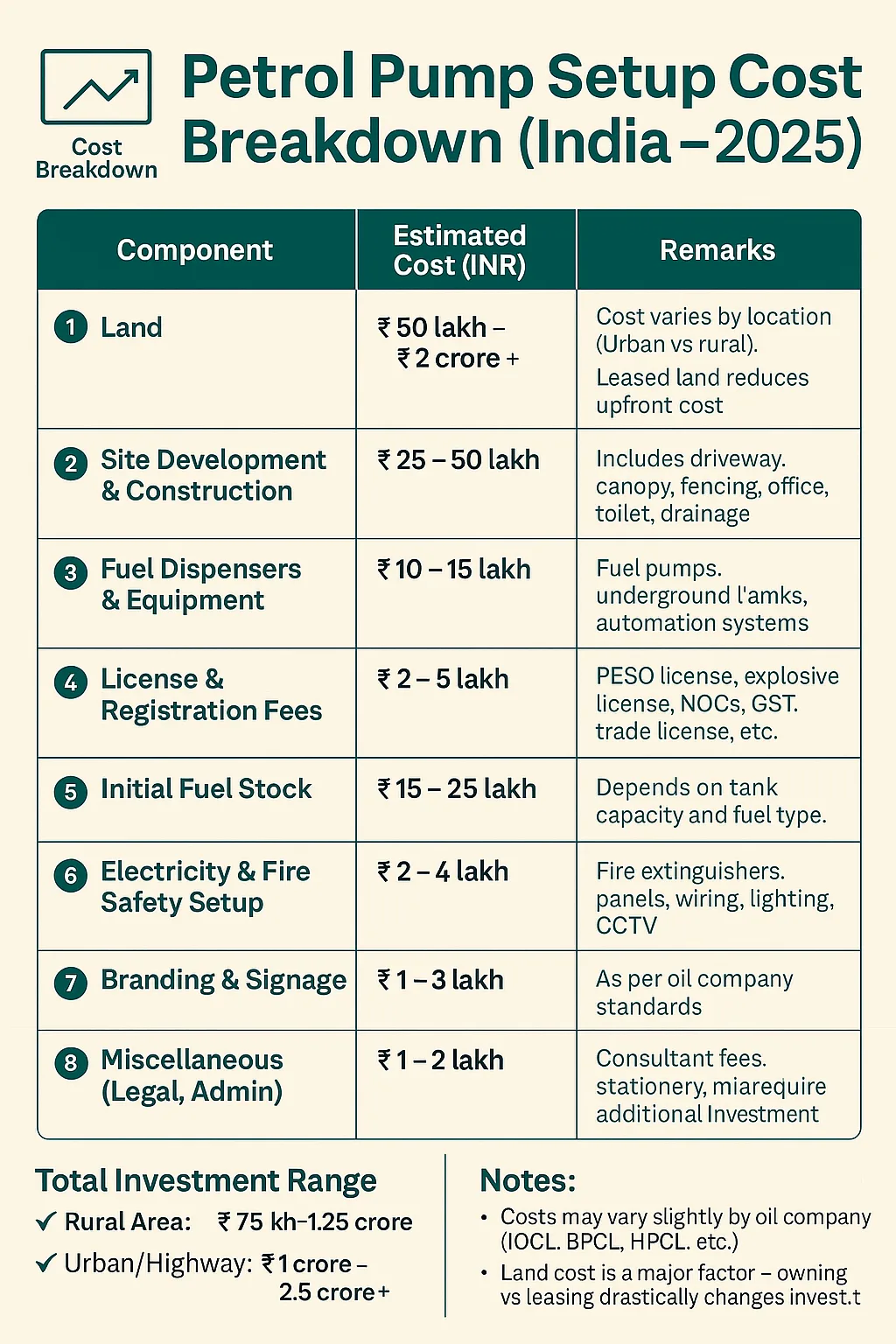
| Expense Category | Estimated Cost (INR) | Details |
|---|---|---|
| Land (if buying) | ₹50 lakh – ₹2 crore+ | Varies based on location: rural, city, or highway. |
| Construction & Site Work | ₹25 lakh – ₹50 lakh | Includes building, driveways, canopy, fencing, and other infrastructure. |
| Fuel Dispensers & Equipment | ₹10 lakh – ₹15 lakh | Fuel pumps, underground tanks, automation systems. |
| Licenses & Permissions | ₹2 lakh – ₹5 lakh | PESO license, NOCs, GST, trade license, and legal approvals. |
| Initial Fuel Stock | ₹15 lakh – ₹25 lakh | First batch of petrol and diesel based on tank size. |
| Electricity & Fire Safety Setup | ₹2 lakh – ₹4 lakh | Power connection, fire extinguishers, lights, CCTV. |
| Branding & Signage | ₹1 lakh – ₹3 lakh | As per oil company design standards. |
| Miscellaneous Expenses | ₹1 lakh – ₹2 lakh | Staff training, office furniture, small setup costs. |
✅ Total Investment Range
- Rural Areas: ₹75 lakh – ₹1.25 crore
- Urban/Highway Locations: ₹1 crore – ₹2.5 crore+
💡 Tip: If you lease land instead of buying, the overall cost drops significantly.
Steps To Apply for a Dealership
The next step on “How to Start a Petrol Pump Business in India” is to apply for a dealership after you are eligible and have a good location in mind. When oil corporations wish to extend their network in specific locations, they offer dealerships for petrol pumps. Official ads are typically used to announce these chances.
📝 How to Apply for a Petrol Pump Dealership
| Step | Details |
|---|---|
| 1. Watch for Advertisements | Oil companies like IOCL, BPCL, and HPCL publish dealership openings in newspapers and on their official websites. |
| 2. Choose a Location Type | Options usually include urban, rural, highway, and SC/ST or women-reserved categories. |
| 3. Fill the Application Form | Applications are submitted online via the company’s official portal (e.g., IOCL, BPCL, HPCL). |
| 4. Pay Application Fees | A non-refundable fee is required (usually between ₹5,000 to ₹10,000). |
| 5. Submit Required Documents | ID proof, education certificates, financial documents, land papers (if applicable), and affidavit of no criminal record. |
| 6. Site Verification & Draw | If multiple people apply for the same spot, the company holds a draw or uses a point-based selection system. |
| 7. Final Approval & LOI | Selected applicants receive a Letter of Intent (LOI) to move forward with setup. |
🔍 Important: Always apply directly on official company websites. Be cautious of fraud or agents promising approvals for money.
Once you receive the Letter Of Intent (LOI), you’re officially on the path to setting up your petrol pump.
Licenses and Permits Requirements on How to Start a Petrol Pump Business in India
Starting a fuel pump requires more than just land and money; you will also need to obtain many government approvals and legal documentation. To ensure that activities run smoothly, safety, and compliance, these permits are required.
📄 List of Important Licenses and Approvals
| License/Permit | Purpose |
|---|---|
| Land Ownership/Lease Documents | Proves that you legally own or have rights to use the land. |
| No Objection Certificate (NOC) | Required from the local municipal body, district collector, or panchayat. |
| Explosive License (PESO) | Issued by the Petroleum and Explosives Safety Organisation (PESO)—this is mandatory for storing and selling fuel. |
| Fire Safety Certificate | Issued by the Petroleum and Explosives Safety Organization (PESO)—this is mandatory for storing and selling fuel. |
| Environmental Clearance | Needed if your location is near protected areas or water bodies. |
| Trade License | Issued by the local municipal authority to run the business. |
| GST Registration | Needed for tax compliance and business billing. |
| Company Dealership Agreement | A legal agreement between you and the oil company that gives you the dealership rights. |
📌 Tip: Many oil companies will guide you through the licensing process after you receive your Letter of Intent (LOI). It’s still helpful to consult a legal expert or agent familiar with petrol pump approvals in your area.
Infrastructure Setup on How to Start a Petrol Pump Business in India
Now, start building your Petrol pump after you have the dealership agreement and all the necessary approvals. Site development is the first stage, which involves levelling the ground, constructing driveways, erecting a canopy, establishing drainage, and providing enough space for cars to drive. Underground fuel storage tanks and premium fuel dispensers (pumps) are then installed.
A small cabin or office for employees, customer waiting areas, restrooms, lighting, and CCTV cameras are also necessary for safety. Remember that fire safety equipment, such as sand buckets and extinguishers, is required. You must adhere to the standard designs and infrastructure guidelines of the majority of oil companies, particularly regarding branding and layout.
If you plan to add additional services such as a convenience shop, air-filling station, or EV charging, now is the time to plan for them. Your petrol pump may function smoothly from day one with careful planning and expert construction.
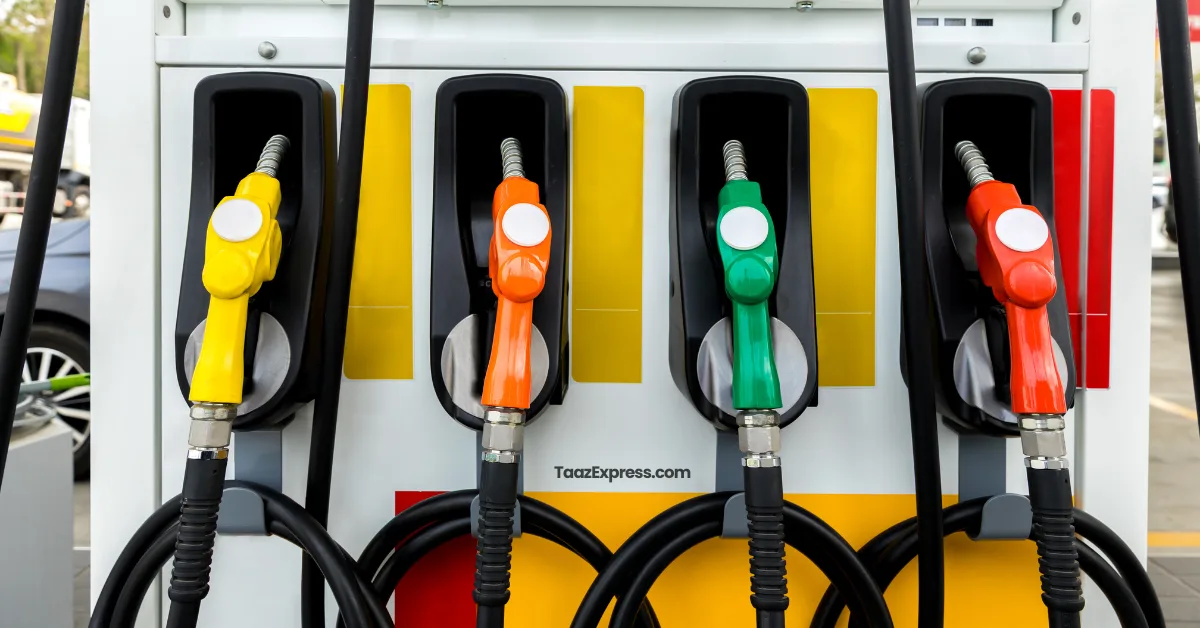
Hiring Staff and Daily Operations
Once the petrol pump is ready, you’ll need a trustworthy staff to keep it operating smoothly. Trained employees are important for your daily operations, handling everything from petrol handling to cash management and customer service.
👥 Staff You’ll Need
| Role | Responsibilities |
|---|---|
| Pump Attendants | Fill fuel in vehicles, handle payments, maintain cleanliness. |
| Cashier/Billing Staff | Manage daily sales, cash handling, and receipts. |
| Manager | Oversee daily operations, stock, staff schedules, and customer issues. |
| Security Guard (optional) | Useful for large or highway pumps, especially for night shifts. |
| Maintenance Helper | Takes care of small repairs, cleaning, and utility tasks. |
🔄 Day-to-Day Operations
| Task | Description |
|---|---|
| Fuel Stock Management | Track fuel levels and request refills from the company. |
| Cash & Digital Payments | Keep daily records of sales, expenses, and payments received. |
| Safety Checks | Daily check of fire safety equipment, dispensers, and storage tanks. |
| Cleanliness & Hygiene | Forecourt and toilets should be kept clean at all times. |
| Customer Service | Train staff to be polite, quick, and helpful to build regular customers. |
💡 Tip: Many successful petrol pumps also add extra services like tyre air filling, engine oil sales, or small refreshment kiosks to increase earnings.
Profit Margins and Growth Tips
Petrol pumps may not have significant profit margins per litre, but they make up for it with large daily volumes. Over time, it can develop into a reliable and successful company with the right location and management.
💸 Profit Margins (as of 2025)
| Fuel Type | Dealer Commission (Approx.) |
|---|---|
| Petrol | ₹3.50 to ₹4.50 per litre |
| Diesel | ₹2.50 to ₹3.50 per litre |
🧮 Example: If your pump sells 5,000 litres of fuel per day, you could earn ₹12,000–₹18,000 in daily commission (before expenses).
📈 Tips to Increase Profits and Grow
| Tip | Why It Helps |
|---|---|
| Offer Engine Oil & Accessories | Free air and water attract more customers to your pump. |
| Air & Water Services | Free air and water attracts more customers to your pump. |
| EV Charging Station | Adding an EV charger can future-proof your business. |
| Build a Small Shop or Café | Many highway pumps earn more from food and drinks than from fuel. |
| Loyalty or Fleet Programs | Tie up with taxi operators or logistics companies for regular sales. |
| Maintain Cleanliness & Good Service | Happy customers become repeat customers and spread the word. |
🚀 Long-Term View: Petrol pumps are a stable business. Margins may change with government policies, but high volume and good service always lead to steady profits.
Get Updates On Business News and Updates From Taaz Express
Conclusion
Starting a Petrol pump in India requires planning, money, and patience, but it may be a profitable long-term business. If you choose a decent location, follow the rules, and offer good service, your petrol pump can provide a consistent income every day. It’s a significant step, but with the right strategy, it can grow into a powerful and dependable business. I hope You Find this “How to Start a Petrol Pump Business in India” article Helpful. Thank You.
FAQs
How much does it cost to start a petrol pump in India?
The average investment to open a petrol pump in India ranges between ₹75 lakh to ₹2.5 crore. Costs depend on land ownership, construction, equipment, and location (urban, rural, or highway).
Can I get a petrol pump dealership without owning land?
Yes. You can apply with leased land, but you must have a registered lease agreement for a minimum number of years (usually 19+ years) when submitting your application.
What is the profit margin in the petrol pump business?
You earn around ₹3.50–₹4.50 per litre on petrol and ₹2.50–₹3.50 per litre on diesel. More sales = more profit. (2025)
Is experience needed to run a petrol pump?
No experience is required, but basic business knowledge and good management skills help.
How long does it take to start a petrol pump after getting approval?
It usually takes 3 to 6 months for setup and licensing after receiving the Letter of Intent (LOI).
Is it better to go for a company-owned or dealer-owned petrol pump?
A dealer-owned-dealer-operated (DODO) model gives you more control and ownership, but you bear all costs. A company-owned-dealer-operated (CODO) model may have lower setup costs, but limited flexibility.
Do I need a technical background to run a petrol pump?
No. There’s no technical degree required. You just need to meet the basic eligibility, follow safety rules, and manage operations well.
